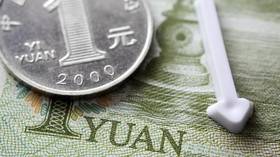Trump finds another scapegoat to blame for US problems… and this time it’s not China
In his morning tweets, US President Donald Trump has switched from blaming China for all of America’s misfortunes to the Federal Reserve, calling on the Fed to accelerate interest-rate cuts.
“Our problem is not China,” the president wrote on Wednesday, boasting that the US economy is stronger than ever. “Our problem is a Federal Reserve that is too proud to admit their mistake of acting too fast and tightening too much.”
“Three more Central Banks cut rates.” Our problem is not China - We are stronger than ever, money is pouring into the U.S. while China is losing companies by the thousands to other countries, and their currency is under siege - Our problem is a Federal Reserve that is too.....
— Donald J. Trump (@realDonaldTrump) August 7, 2019
The tweets followed the news that three central banks –in New Zealand, India and Thailand– all announced larger-than-expected cuts to interest rates. Trump wants the Fed to act now, as other countries “do well” at the expense of the US.
“They must Cut Rates bigger and faster, and stop their ridiculous quantitative tightening NOW,” the president recommended, pointing to a wide yield curve, which is considered one of the important indicators of a market’s recession.
Rates on benchmark 10-year Treasury notes fell 1.714 percent on Monday and continued to tumble on Wednesday to 1.633 percent, the lowest since October 4, 2016, according to CNBC. At the same time the spread between the yield on the three-month Treasury notes and that of 10-year bills was close to -40 basis points. It is the biggest inversion since April 2007, right before the start of the financial crisis.
It’s not the first time Trump criticized the Fed’s policy, but it’s quite rare for him to say that Beijing is not to blame for something. Earlier this week, he called China a “currency manipulator.” Several hours after that, China was officially given that label by the US Treasury, allowing the US to file a complaint to the International Monetary Fund (IMF), among other measures.
Beijing has repeatedly rejected the accusations, arguing that Trump’s tariffs on its exports led to the weakening of its currency. The yuan’s level against the dollar was set at 6.9996 on Wednesday, close to the psychologically key seven points to the US dollar.
For more stories on economy & finance visit RT's business section















